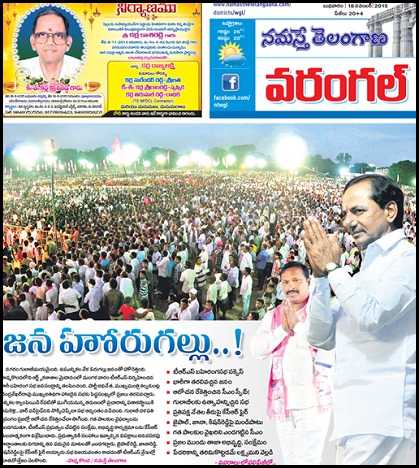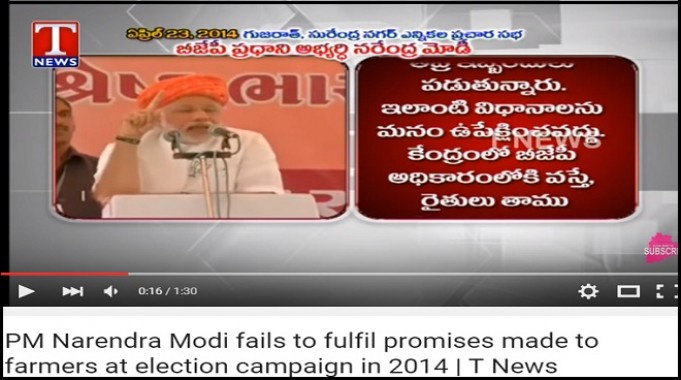Paid news in Telangana bypoll?
The by-election to Warangal parliamentary constituency scheduled to be held on November 21 has once again brought the charges of paid news to the fore, and the conduct of media houses owned by political families is coming under the lens. This time it is the media house owned by the family of Telangana Chief Minister K. Chandrasekhar Rao, popularly known as KCR, which is facing allegations of unethical journalism.
Both the opposition Congress and the TDP-BJP combine have repeatedly alleged that the Namasthe Telangana newspaper and the TNews channel brazenly indulge in propaganda journalism in favour of the ruling Telangana Rashtra Samithi (TRS). These parties have also petitioned the Election Commission that the entire coverage of both the media organs be considered paid news and that the value of this paid news, as per the tariff of the media house, should be included in the poll expenditure of the ruling party candidate.
The by-poll to the Warangal constituency was necessitated when Kadiam Srihari, sitting MP resigned after being inducted into the state cabinet. The cause for the inclusion of Srihari, a dalit, as Deputy Chief Minister was the earlier dismissal of Dr. Rajayya, another dalit from the same district, on charges of corruption by the CM. (Before the formation of Telangana KCR promised that a dalit will be the first CM. He didn't keep his promise but compensated by making a dalit and a Muslim Deputy CM).
Opposition candidates from the TDP-BJP combine, Congress, YSR Congress and the Left Coalition are challenging the ruling party nominee in this crucial by-election. It has become important for the ruling party which has been courting severe criticism not only from the opposition but also from civil society groups for various reasons.
Telangana, which has witnessed more than 1500 suicides by farmers after its formation as a new state, has been reeling under drought conditions during the just concluded kharif season, making matters worse for the ruling party. The government's handling of the farm crisis attracted widespread criticism.
Presently serious discontent prevails among farmers across the state because they have been unable to get a compensatory price for their produce owing to the apathy of both the Cotton Corporation of India and the state government. The beleaguered TRS has been avoiding by-elections for quite some time. Immediately after coming to power in the new state with a slender margin, the TRS leadership encouraged defections from opposition parties and as many as nine MLAs from the opposition parties including Congress, TDP and YSR Congress joined the ruling party.
The opposition parties petitioned the Assembly Speaker to disqualify the defected MLAs but all the petitions are pending with the Speaker as he is yet to accept their resignations in the first place. The pending resignations include one by Talasani Srinivas Yadav, who was given a ministerial berth immediately after his defection from the TDP last December. But Warangal was a different story with the Lok Sabha Speaker immediately accepting the resignation of Srihari and the Election Commission taking up the vacancy in due course.
In the 2014 general elections Sakshi newspaper and Sakshi news channel which belong to the family of Y. S. Jaganmohan Reddy, president of YSR Congress, also faced similar charges, along with the Namasthe Telangana group. This time, the Sakshi group was spared as its coverage included a reasonable space for the electioneering of other parties, though Y. S. Jagan got the lion’s share. But Namasthe Telangana and TNews continue to attract heaps of criticism as polling day draws closer.
A quick scan of Namasthe Telangana, a daily broadsheet, over the last one week turns out to be quite revealing.

Front page of Namasthe Telangana, Warangal edition, 18 November, 2015
Space for campaign-related news stories in the main edition is fully allotted to the ruling TRS. Once in a while, a small report on opposition parties is given, usually with a negative charge. For instance, one report says that the TDP was distributing money to voters. Another news story alleges that there was no coordination between the TDP and BJP which fielded a common candidate belonging to the latter.
Yet another report highlights an intra party squabble in the Congress. In the main edition a huge special story is given almost every day on the poll scene, apart from the regular coverage. One story says that TRS is the only true representative of Telangana. Another claims that the majority of the voters in Warangal believe that a vote for any party other than the TRS will go to waste.
But the real story lies in the tabloid district edition. In the highly compartmentalised media scenario of the two Telugu states, coverage in the local edition is the most coveted because a majority of readers go straight for that. All the contesting opposition parties put together are being given about 10 to 15 percent coverage space in Namasthe Telangana and the reportage makes interesting reading. On the day that former Speaker Meera Kumar and Central Minister Hansraj Gangaram campaigned in the district, a report on the Meera Kumar election rally in Namasthe Telangana is headlined "BJP should be taught a lesson".
Another two short reports on Hansraj Gangaram are run with captions like "Centre committed to development of Telangana" and "Progress possible only under Modi". Nowhere in the reports can one find any criticism of the TRS even though leaders from Delhi unleashed a diatribe against TRS rule.
Another day, a report in Namasthe Telangana on Y. S. Jagan's campaign for his party candidate calls for targeting the TDP-BJP combine. One more report on the campaign by former Central Minister Susil Kumar Shinde criticizes the Union Government for inaction. On the ground, all the opposition parties are targeting KCR as only he matters in the hierarchy of his regional party and his style of functioning leaves no scope for others in the party to stand even a distant second. Even the small space given to the opposition campaign is carefully edited to omit this criticism and pit the opposition parties against one another.
On the other hand, mainstream dailies like Eanadu, Andhra Jyothi and Andhra Bhoomi are dividing campaign space more or less judiciously among the contesting parties. In fact, the ruling TRS enjoys an edge over the other parties in its share. Andhra Jyoti, engaged in a bitter struggle with the TRS leadership after the removal of their news channel ABN Andhra Jyoti from the cable network in June 2014, maintains balance. For instance, a day before KCR's tour in Warangal, the tabloid of this daily leads with a curtain raiser for the campaign. That Andhra Jyoti gives many stories critical of the ruling party is another matter.
While this is the state of affairs in print, coverage in TNews channel leaves a lot to be desired. No airtime is given to the opposition except in cases where reporting can do damage to them. A good example is the utterances of former Union Minister Balaram Naik. In one rally he said that if the Congress is not elected, Telangana will be re-merged into Andhra Pradesh. This comment made in jest was played by TNews to the hilt. Besides the coverage of ruling party campaign, TNews’ air timeis devoted to stories eulogising the leadership of KCR and the "good" he is doing for the new state.
In the general election too political parties petitioned the Election Commission against the Sakshi and Namasthe Telangana groups. But nothing came of it.There was also a committee constituted by the State Chief Electoral Officer with civil society members including media persons. The committee did not even take cognisance of these charges.
The menace of paid news, which first brought to light by the Andhra Pradesh Union of Working Journalists during the 2009 elections, is still rampant in both the Telugu states. But so far no political party or candidate has been brought to book by the Election Commission. Against this backdrop, unethical coverage by media houses owned by political families assumes disturbing proportions. Until something is done to establish rules to eliminate conflict of interest or to change the rules of play, the phenomenon will become entrenched.
